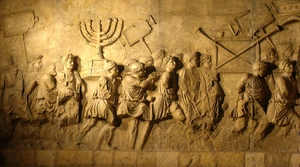Proceeding from a Christo-centric view of History as a linear and purposeful succession of events that are centered around the Revelation of Jesus Christ and the consummation of all things in Him, we also observe that the 6th-5th c. B.C. had a significant role to play in the development of the preparatio evangelica towards the advent of Christ. This period of world-history was characterized by reform movements worldwide.
Middle-East:
The Babylonian invasion of Israel, the burning of the temple, and the rise of Prophetical reforms among the Jews. The shift of focus from the temple to worship in spirit and in truth. The prophets in action as Ezekiel, Daniel, Jeremiah, and also Haggai and Zechariah, while Ezra and Nehemiah lead the Jews who return to Jerusalem in true spirituality. The gentiles also witness the Sovereignty of YHWH and His rule over all the earth.
Zoroastrianism is widespread in Persia (the traditional view placing Zoroaster in the 6th c. B.C.).
Europe:
Greek Philosophy comes to surface. Reason supersedes blind faith, investigates belief, and unleashes the search for true wisdom.
Asia:
Jainism and Buddhism rise as protest and reform movements in India. They protest against violence, priestcraft, practice of sacrifice, polytheism, and the social evils and preach a highly ethical and non-violent path. The religion of ahimsa (non-violence) is taught in the people's own tongue, and not in the elite Sanskrit. The way is opened to all people.
In China, Confucianism teaches what the ultimate goal of religion is.
Whether these reform movements were in anyway influenced by the Jewish diaspora is a thesis that needs to be researched. However, one thing is evident. The spiritual wall between Jerusalem and the world was being leveled down as people everywhere openly begin to seek the way of the right and the vision of Truth. Corruption would soon creep into each of these various movements, but reforms would spring up now and then again and again. The Spirit of Christ prepares peoples and cultures for the salvation of God by turning their hearts away from the vanity of vain religion. Yet, the shackles haven't been fully broken. Yet, the world has been saved from the cascade of self-destruction.
We also begin to see several key theological truths emerge during these years:
1. God is Sovereign. He overthrows the wicked and will destroy evil. (Judaism, Zoroastrianism)
2. God must be worshiped in Spirit and in truth and not merely through rituals of religion. (Judaism)
3. True religion doesn't consist in cants, castes, and creeds. True religion is personal and salvific. (Jainism, Buddhism)
4. Animal sacrifices cannot bring deliverance. Sacrifice should be personal. Salvation consists in emancipation from the bondage of human lusts and passions. (Jainism, Buddhism)
5. Duty towards our neighbor is more important than the knowledge of metaphysics, or of heaven and of hell. (Confucianism)
6. Morality cannot be based upon polytheistic beliefs. (Greek Philosophy)
7. The Good is the golden path between the extremism of hedonism and asceticism. (Aristotle, Gautama Buddha).
© Domenic Marbaniang, February 2, 2011.

Comments
Post a Comment